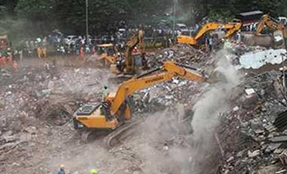WHY THEY ARE, WHAT THEY ARE & WHAT WE MUST BE

Pancake Collapse “A classic Pancake – Collapse” declared the expert on Television. ‘Pancake – collapse’, the horror that befell ‘Tarique Gardens’, a five storied building in Mahad, is considered the worst collapse a multi-storeyed building can suffer because each floor crashes over the one below telescoping groundward trapping everything underneath. Rescue becomes difficult and painfully slow because debris has to be cleared layer by layer from the top. Pancake collapse happens when columns of the structure are woefully weak. Even an infinitesimal increase in load beyond the threshold can trigger a collapse, waiting to happen anytime. This catastrophe happens not due to omissions but through criminal indulgence. The two key issues that determine structural longevity are inherent strength and tolerance . Collapse - Organisations and Individuals Pancake – collapse is not confined to lifeless concrete structures alone. It happens with organisations and worse with individuals too. Why ...
